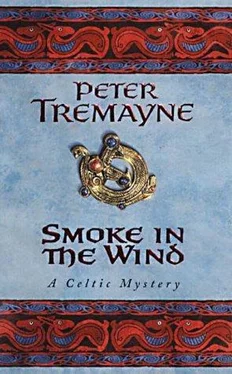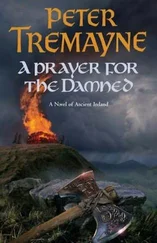Peter Tremayne - Smoke in the Wind
Здесь есть возможность читать онлайн «Peter Tremayne - Smoke in the Wind» весь текст электронной книги совершенно бесплатно (целиком полную версию без сокращений). В некоторых случаях можно слушать аудио, скачать через торрент в формате fb2 и присутствует краткое содержание. Жанр: Исторический детектив, на английском языке. Описание произведения, (предисловие) а так же отзывы посетителей доступны на портале библиотеки ЛибКат.
- Название:Smoke in the Wind
- Автор:
- Жанр:
- Год:неизвестен
- ISBN:нет данных
- Рейтинг книги:5 / 5. Голосов: 1
-
Избранное:Добавить в избранное
- Отзывы:
-
Ваша оценка:
- 100
- 1
- 2
- 3
- 4
- 5
Smoke in the Wind: краткое содержание, описание и аннотация
Предлагаем к чтению аннотацию, описание, краткое содержание или предисловие (зависит от того, что написал сам автор книги «Smoke in the Wind»). Если вы не нашли необходимую информацию о книге — напишите в комментариях, мы постараемся отыскать её.
Smoke in the Wind — читать онлайн бесплатно полную книгу (весь текст) целиком
Ниже представлен текст книги, разбитый по страницам. Система сохранения места последней прочитанной страницы, позволяет с удобством читать онлайн бесплатно книгу «Smoke in the Wind», без необходимости каждый раз заново искать на чём Вы остановились. Поставьте закладку, и сможете в любой момент перейти на страницу, на которой закончили чтение.
Интервал:
Закладка:
‘I understand more than I speak,’ confirmed Eadulf.
Brother Meurig certainly appeared relieved that they were no longer calling on his service as guide and interpreter. ‘Then I shall remain here and continue the investigation.’
Fidelma smiled. ‘We shall look forward to hearing your resolution when we return after our inquiries at Llanpadern.’
Chapter Seven
It was a bright, crisp autumnal day, with a pale blue sky and no clouds to block the tepid warmth of the early morning sun. Fidelma and Eadulf had bidden farewell to Brother Meurig and to Gwnda, the lord of Pen Caer, and begun their journey south-west towards the distant peak of Carn Gelli. The countryside was a mixture of moorland and crags, and isolated farmland surrounded by wooded valleys into which gushing streams, too small to be called rivers, cascaded from the surrounding hills.
It was an ancient landscape with a variety of cairns, cromlechs, standing stones and abandoned hillforts. Fidelma had noticed that there were also a fair number of burial chambers where only chieftains or men and women of high rank would be laid to rest. It was a landscape that showed signs of a wealth of wild flowers amidst the gorse and various species of ferns and heather. At the moment there were only a few patches of white blossoms, such as shepherd’s purse and white deadnettle, which displayed any relief against the green. Generally the countryside was sinking into its drab, almost colourless winter appearance.
High above them, the occasional kestrel flew in lazy circles, keen eyes watching for prey among the dying brownish bracken and evergreen gorse. A flash of red moved quickly as a fox went dashing for cover, more out of habit than fear of a kestrel, for its size made it quite safe. It was field mice, voles and hatchlings that the bird of prey was seeking.
As they rode along the track, it was the first time that Fidelma and Eadulf had been alone for some days. Eadulf had been watching his companion keenly.
‘You are worried about the youth, Idwal, aren’t you?’ he said finally, breaking the silence.
She glanced at him and smiled briefly. ‘You have a discerning eye.’
‘You believe he is innocent?’
Fidelma pouted thoughtfully. ‘I believe that there are many questions to be answered.’
‘I think that you would have liked to take charge of Brother Meurig’s investigation,’ Eadulf observed in gentle accusation.
‘As the Blessed Ambrose said — Quando hic sum, non ieuiuno Sabbato .’
Eadulf frowned for a moment. ‘You mean. .’
‘I mean, I follow the local law and custom. I do not have the right to dictate to a barnwr of this country. I have no wish to take over from Brother Meurig.’
Even as she spoke, Fidelma realised, with an inward sense of annoyance, that she was lying. She flushed and hoped that Eadulf did not notice.
‘Well, Brother Meurig seems competent enough.’
‘So long as Brother Meurig asks the right questions, there is an end to it. No one can dictate his interpretation of the answers. We, however, must concentrate on our commission. The sooner we resolve this matter, the sooner we can continue to Canterbury.’
They fell silent for a while.
The road from the township to the community of Llanpadern was an easy one, hardly more than three kilometres. They soon came within sight of the complex of buildings below the hill which Brother Meurig had identified as Carn Gelli. The buildings seemed isolated; even had Fidelma not been informed of the disappearance of the community, she would have felt that something was amiss simply by the atmosphere emanating from the buildings. That inexplicable aura of solitude seemed menacing. Fidelma was sensitive to atmosphere. Perhaps that very intuitiveness was the reason why she excelled in her profession. It gave her the ability to sense liars. She felt the twinge of guilt again. She had wanted to take charge of the investigation into Mair’s death for her instinct made her feel that Idwal was speaking the truth.
They continued to ride along the path to the gates and Eadulf leant forward from his mount and pushed against them. They were not secured from the inside and swung open. The courtyard beyond was deserted. Eadulf halted his horse and the breath hissed between his teeth in a nervous whistle. His eye was immediately caught by the great stack of wood which was clearly laid for a bonfire. Fidelma walked her horse to a tethering pole and dismounted, hitching the animal’s reins to it.
Eadulf found that he could not suppress a shiver as he glanced around at the silent buildings. Fidelma noticed his movement but said nothing. Things unseen did not cause her apprehension. It was things manifest and physical that brought danger. She waited until Eadulf had dismounted before she walked slowly back to the gates and stood looking down. Eadulf joined her. She glanced up at him.
‘There are too many tracks here, too much coming and going, and there has also been rain over the last few days which has obscured anything which might tell us about movements here.’
‘You do not trust Brother Cyngar’s word when he told you that he examined the area for traces which would indicate how the community departed?’ Eadulf asked.
Fidelma was irritated by the question. ‘I accept that he spoke his truth. It is always a good thing to check whether it coincides with your own. We won’t find much in the way of tracks. See the road by which we came from Llanwnda? And that other one to the west? Mostly stone-strewn tracks. We shall not be able to pick up traces on those roads unless we have good luck.’
She swung the gates shut before turning back into the courtyard and examining the scene thoughtfully.
‘If this place was subjected to a raid by Saxons,’ Eadulf said, reading her thoughts, ‘then they were very neat and tidy. Nothing destroyed, nothing burnt, no bodies. .’
‘Yet this boy Dewi said there were bodies left on the beach where the Saxon ship anchored,’ she pointed out. ‘Now, where shall we start? Somewhere in this deserted place must be a clue to what happened here.’
Eadulf did not appear convinced. ‘What if that which happened here is inexplicable?’ he muttered.
Fidelma actually laughed, low and musically. ‘ Omne ignotum pro magnifico est .’
Eadulf recognised the line from Agricola by Tacitus. He had heard it used several times before when his mentors had mocked his Saxon superstitions. ‘Everything unknown is thought magnificent.’ It was often used to point out that the unknown was thought to be supernatural when, in reality, it could easily be interpreted once the facts were known. He felt hurt by her remark, for he felt it was aimed at his Saxon background, so he did not respond.
She was already striding towards a door. It led into the sleeping quarters of the community.
Like Brother Cyngar before them, they found the beds neat and tidy, nothing disturbed. The same was true of the chamber of the Father Superior.
It was when they entered the gloomy refectory that Eadulf found the noxious odours in the deserted room almost overpowering. The food was still mouldering on the tables.
‘Must we?’ he muttered, raising a hand to cover his nose, as Fidelma moved resolutely into the hall.
Fidelma’s glance was one of rebuke. ‘If we are to uncover the mystery, then we must be prepared to examine everything in case we miss something which would give an indication of the cause.’
Reluctantly, Eadulf followed Fidelma as she walked slowly between tables on which lay the remains of the last meal that had been served to the brethren of the community of Llanpadern. There was evidence that scavengers had entered and made free with the food on the tables after it had been deserted. The mouldering bread and rotting cheese had clearly been attacked by the sharp teeth of rodents. Yet it was not this that Fidelma was concentrating on.
Читать дальшеИнтервал:
Закладка:
Похожие книги на «Smoke in the Wind»
Представляем Вашему вниманию похожие книги на «Smoke in the Wind» списком для выбора. Мы отобрали схожую по названию и смыслу литературу в надежде предоставить читателям больше вариантов отыскать новые, интересные, ещё непрочитанные произведения.
Обсуждение, отзывы о книге «Smoke in the Wind» и просто собственные мнения читателей. Оставьте ваши комментарии, напишите, что Вы думаете о произведении, его смысле или главных героях. Укажите что конкретно понравилось, а что нет, и почему Вы так считаете.












